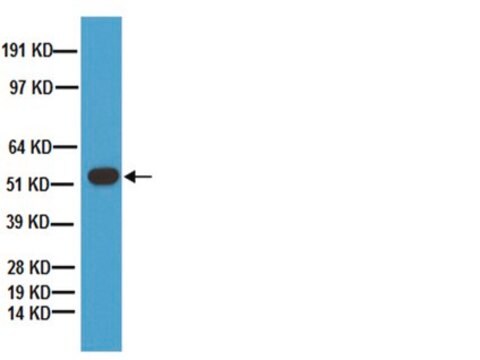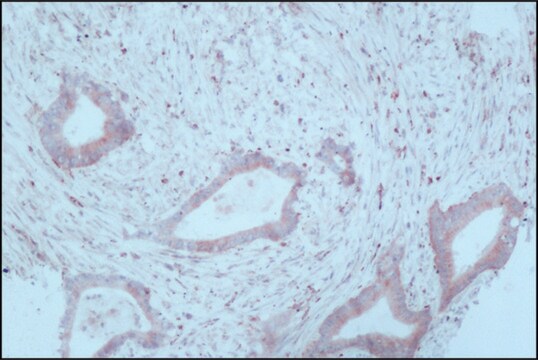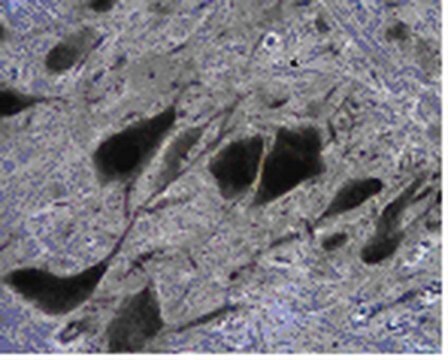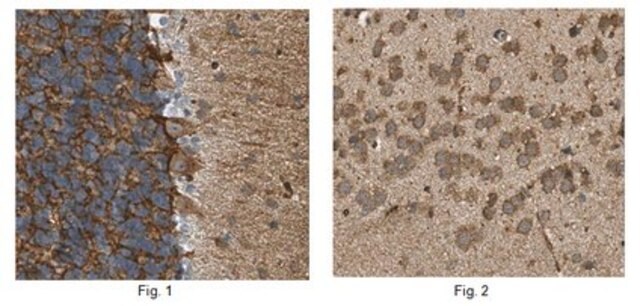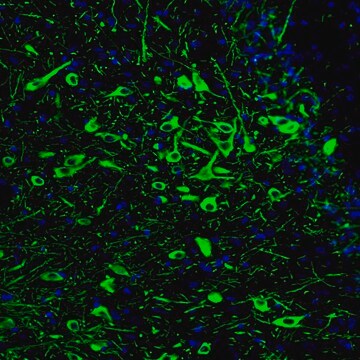T8575
Anti-Tryptophan Hydroxylase antibody produced in sheep
affinity isolated antibody, buffered aqueous glycerol solution
Synonym(s):
Anti-TPH
Sign Into View Organizational & Contract Pricing
All Photos(1)
About This Item
Recommended Products
biological source
sheep
Quality Level
conjugate
unconjugated
antibody form
affinity isolated antibody
antibody product type
primary antibodies
clone
polyclonal
form
buffered aqueous glycerol solution
usage
sufficient for 10 blots
species reactivity
mammals, human
technique(s)
western blot: 1:1,000 using human dorsal raphe nucleus
UniProt accession no.
shipped in
wet ice
storage temp.
−20°C
Gene Information
human ... TPH1(7166)
mouse ... Tph1(21990)
rat ... Tph1(24848)
General description
The tryptophan hydroxylase 1 (TPH1) gene spanning 29kbp with 11 exons is mapped to human chromosome 11p15.3-p14. TPH1, is a 444 amino acid protein expressed in the gut, spleen, thymus and also in the pineal gland and the pituitary.
Tryptophan Hydroxylase (TPH) is a member of the aromatic amino acid hydroxylases (AAAH) family.
Immunogen
recombinant rabbit tryptophan hydroxylase, isolated as inclusion bodies from E. coli and purified by preparative SDS-PAGE.
Application
Anti-Tryptophan Hydroxylase antibody produced in sheep has been used in:
- immunocytochemistry
- immunohistochemistry
- immunofluorescence
- immunoperoxidase staining
Biochem/physiol Actions
The tryptophan hydroxylase 1 gene (TPH1) catalyzes the synthesis of 5-hydroxytryptophan, which is a precursor to the neurotransmitter serotonin. Variation in the gene expression affects prefrontal cortex activation during response inhibition. Mutation in the TPH1 gene leads to schizophrenia, irritable bowel syndrome (IBS) in women, suicidal behavior and depressive disorders. The encoded protein plays a vital role in regulation of cardiovascular function.
Physical form
Solution in 150 mM NaCl, 10 mM HEPES, pH 7.5, 100 μg per mL BSA, and 50% glycerol.
Disclaimer
Unless otherwise stated in our catalog or other company documentation accompanying the product(s), our products are intended for research use only and are not to be used for any other purpose, which includes but is not limited to, unauthorized commercial uses, in vitro diagnostic uses, ex vivo or in vivo therapeutic uses or any type of consumption or application to humans or animals.
Not finding the right product?
Try our Product Selector Tool.
recommended
Product No.
Description
Pricing
Storage Class Code
10 - Combustible liquids
WGK
WGK 3
Flash Point(F)
Not applicable
Flash Point(C)
Not applicable
Personal Protective Equipment
dust mask type N95 (US), Eyeshields, Gloves
Choose from one of the most recent versions:
Already Own This Product?
Find documentation for the products that you have recently purchased in the Document Library.
Kristina M Wright et al.
eLife, 8 (2019-03-08)
Faced with potential harm, individuals must estimate the probability of threat and initiate an appropriate fear response. In the prevailing view, threat probability estimates are relayed to the ventrolateral periaqueductal gray (vlPAG) to organize fear output. A straightforward prediction is
TPH1 A218C polymorphism and temperament in major depression.
Andre K
BMC Psychiatry (2013)
B M Spannuth et al.
Neuroscience, 179, 104-119 (2011-02-01)
Serotonergic systems are thought to play an important role in control of motor activity and emotional states. We used a fear-potentiated startle paradigm to investigate the effects of a motor-eliciting stimulus in the presence or absence of induction of an
Matthew W Hale et al.
Psychopharmacology, 213(2-3), 243-264 (2010-11-20)
Dysfunction of serotonergic systems is thought to play an important role in a number of neurological and psychiatric disorders. Recent studies suggest that there is anatomical and functional diversity among serotonergic systems innervating forebrain systems involved in the control of
TPH gene polymorphisms are associated with disease perception and quality of life in women with irritable bowel syndrome.
Jun SE
Biological Research for Nursing, 16, 95-104 (2014)
Our team of scientists has experience in all areas of research including Life Science, Material Science, Chemical Synthesis, Chromatography, Analytical and many others.
Contact Technical Service